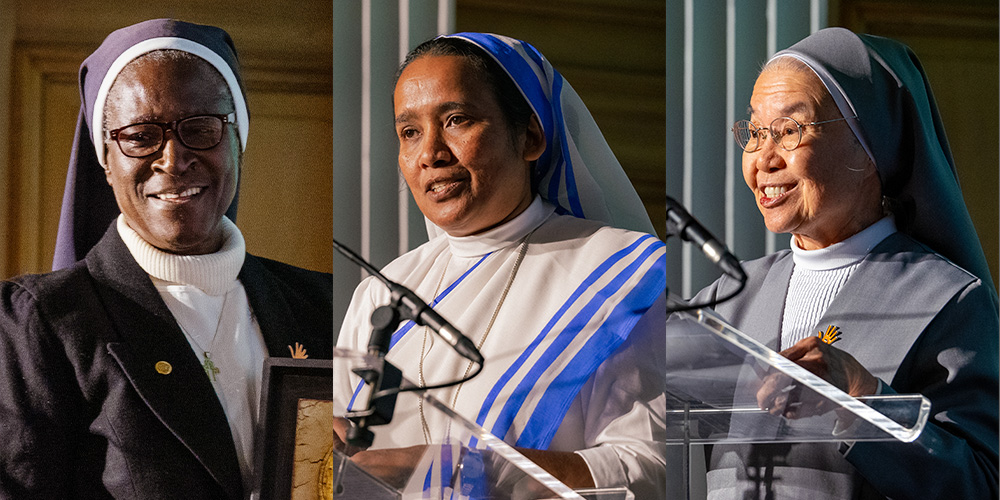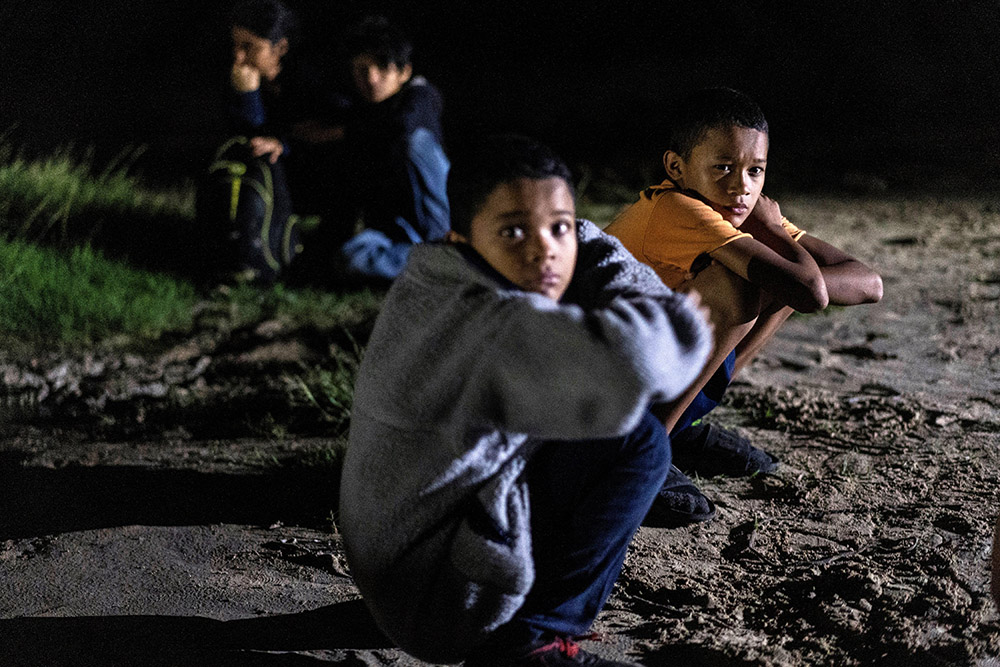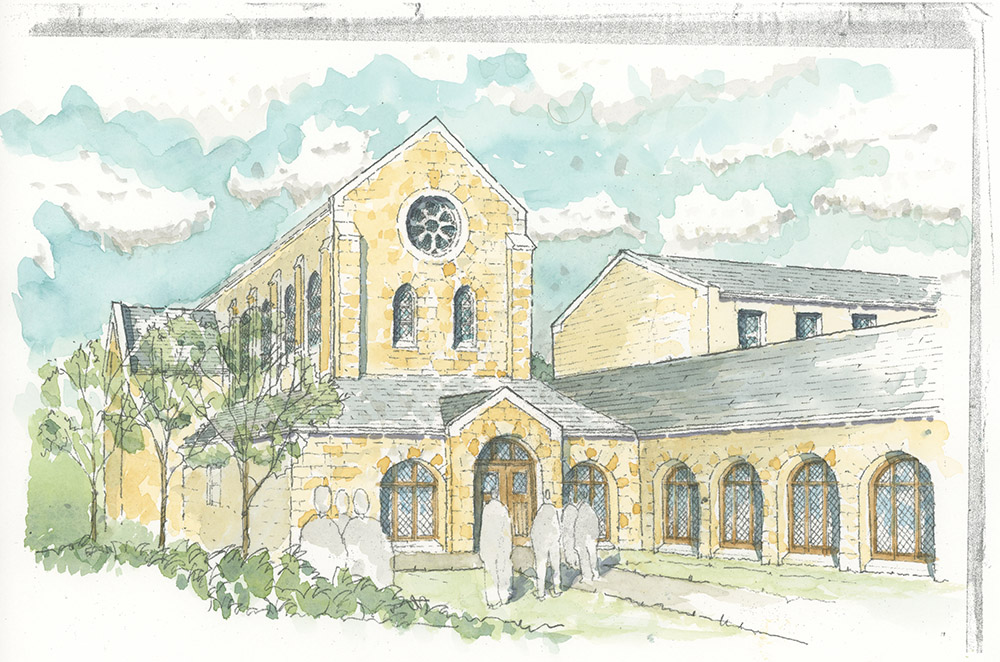
From left: St. Louis Sr. Patricia Ebegbulem; Mary Immaculate Sr. Seli Thomas; St. Paul of Chartres Sr. Francoise Jiranonda (Photos courtesy of the Sisters Anti-Trafficking Awards)
Editor's note: Global Sisters Report's Monday Starter is a feature from GSR staff writers that rounds up news from or about women religious that you may otherwise have missed.

The inaugural Sisters Anti-Trafficking Awards were held Oct. 31 in London, honoring Sr. Patricia Ebegbulem from Nigeria, Sr. Seli Thomas from India, and Sr. Francoise Jiranonda from Thailand.
The event featured a keynote address by British Member of Parliament Theresa May. May was prime minister of the United Kingdom from 2016 to 2019.
Ebegbulem, a member of the Sisters of St. Louis, won the Human Dignity Award for lifetime achievement in addressing exploitation. She has established and run a shelter for victims of human trafficking, organized support services for survivors of sex trafficking, runs mass awareness programs in high-risk areas and schools, and is a national leader on the issue in Nigeria.
Thomas, a member of the Sisters of Mary Immaculate, won the Common Good Award for courage and creativity in addressing exploitation. She works to prevent young people from being exploited by reaching out to the children of the brothel district as well as running awareness camps and training women. She provides free legal aid, and conducts seminars and workshops for villages, schoolteachers, and students on safe migration and human trafficking. She has helped rescue exploited girls and prosecute traffickers.
Advertisement
Jiranonda, of the Sisters of St. Paul of Chartres, won the Servant Leadership Award for excellence in network building. She has opened two schools, which protect vulnerable young Thai women from the sex trade by teaching vocational skills for free after high school. She was the director of Talitha Kum Thailand, which was recognized by the Thai government for its prevention and advocacy work.
Co-hosted by Arise, the International Union of Superiors General and the Conrad N. Hilton Foundation, the awards ceremony drew 200 people.
Immigration bill lauded by anti-human-trafficking advocates
The Alliance to End Human Trafficking, formerly known as U.S. Catholic Sisters Against Human Trafficking, and the National Advocacy Center of the Sisters of the Good Shepherd lauded the Nov. 1 introduction of the Immigration Court Efficiency and Children's Court Act in both the House and Senate.
Advocates say the bill would make meaningful progress in improving immigration proceedings for unaccompanied children and be a formal process to combat human trafficking. Unaccompanied children in the United States are defenseless and at high risk of being trafficked.
"Our team and partners spent a great deal of time this summer and fall discussing possible policy and legislative options to mitigate the risk of human trafficking faced by migrants," Alliance to End Human Trafficking executive director Katie Boller Gosewisch said in a written statement announcing the bill. "These three options, the special docket for children, rapid work authorization for asylees, and provisions in legislation that both support displaced persons and improve conditions so that migration isn't necessary, are very promising actions that support and promote the dignity of all."

Unaccompanied minors who are migrants from Honduras sit on the riverbank in Roma, Texas, after crossing the Rio Grande July 9, 2021. (OSV News/Reuters/Go Nakamura)
Over the course of the next several months, the two organizations will also be advocating for:
- Addressing the root causes of forced migration, with provisions such as aid for sustainable development and humanitarian assistance that provides support for food security, housing, employment, education and health care; support for both internally displaced persons and refugees to enable them to avoid undertaking the journey to the United States; and financial support to nongovernmental organizations that seek to enable people to remain in their home countries in safety.
- Rapid work authorizations for asylum seekers, as the inability to work leaves people vulnerable to exploitation.
"The United States' identity is inextricably bound to the idea of offering safe haven to those needing protection and those seeking refuge and a better life. If we are to live up to this ideal, we must do what is ours to do and reduce these particular vulnerabilities to human trafficking which is the antithesis of safety," Fran Eskin-Royer, executive director of the National Advocacy Center of the Sisters of the Good Shepherd, said in the announcement. "We must find ways to give immigrants and asylum seekers stronger footing — be it through faster access to work permits, better protections for unaccompanied children, or supporting their development and dignity in their home countries."
At 2 p.m. Eastern Standard Time Nov. 8, the anti-trafficking coalition of the U.S. Conference of Catholic Bishops continues its monthly St. Josephine Bakhita Prayer Service, which you can join here. The prayer service is held on the eighth of every month, and each month explores a different issue connected to trafficking. The November service focuses on runaway and homeless youth.
Wisconsin Cistercians close to fundraising goal for new monastery
Back in 2019, Global Sisters Report told you about the Cistercian Nuns of the Valley of Our Lady Monastery in Prairie du Sac, Wisconsin, a cloistered, contemplative order, and their efforts to build a new monastery.
The nuns arrived in Wisconsin from Switzerland in 1957 and moved into a "temporary" conglomeration of buildings that they still live in today.
In 2019, they were in the second year of a fundraising campaign to pay for construction; an earlier campaign had paid for the land for the new monastery and initial design work.

An artist's rendering of the exterior of the new monastery for the Cistercian Nuns of Valley of Our Lady Monastery (Courtesy of the Cistercian Sisters)
Today, despite the challenges of raising money from behind a papal enclosure, they have raised just over $25 million of their $26 million budget. Construction is nearing completion and they will start moving into the new complex in January. First to move will be the production of altar breads, which is their main source of income. Each year, they supply about 13 million breads to churches across the nation.
"We remain humbled and grateful for all the support for the project and for our life of prayer," they wrote in their latest update. "With so many generous benefactors, our fundraising has gone remarkably well, far exceeding all expectations. The project costs too have exceeded all expectations! With the unprecedented inflation, supply and labor shortages, unexpected challenges, complexities, and delays, the seemingly never-ending value engineering and budget cuts — Our Lord's guidance and intervention through it all shows us just how much He wants this house, for His glory."
The band of 22 nuns is hopeful about raising the rest of the money, especially since someone has offered to match all donations up to $500,000.
As of Nov. 1, workers were racing to finish exterior work before winter begins, while the interior is getting flooring, lighting, trim and cabinetry.





